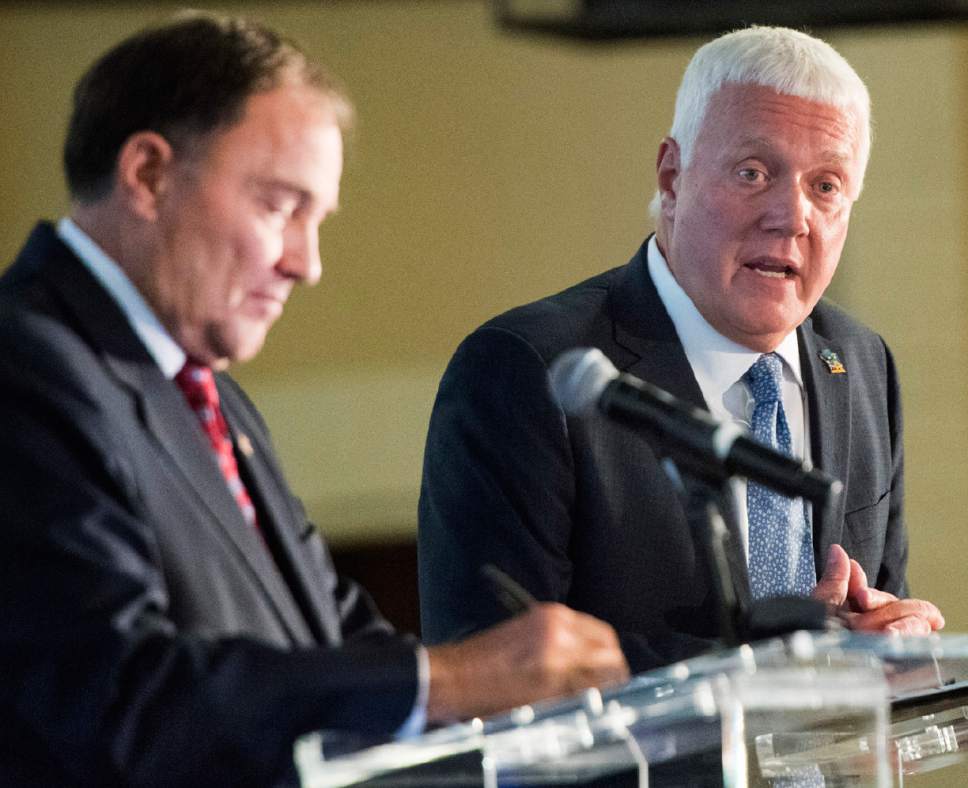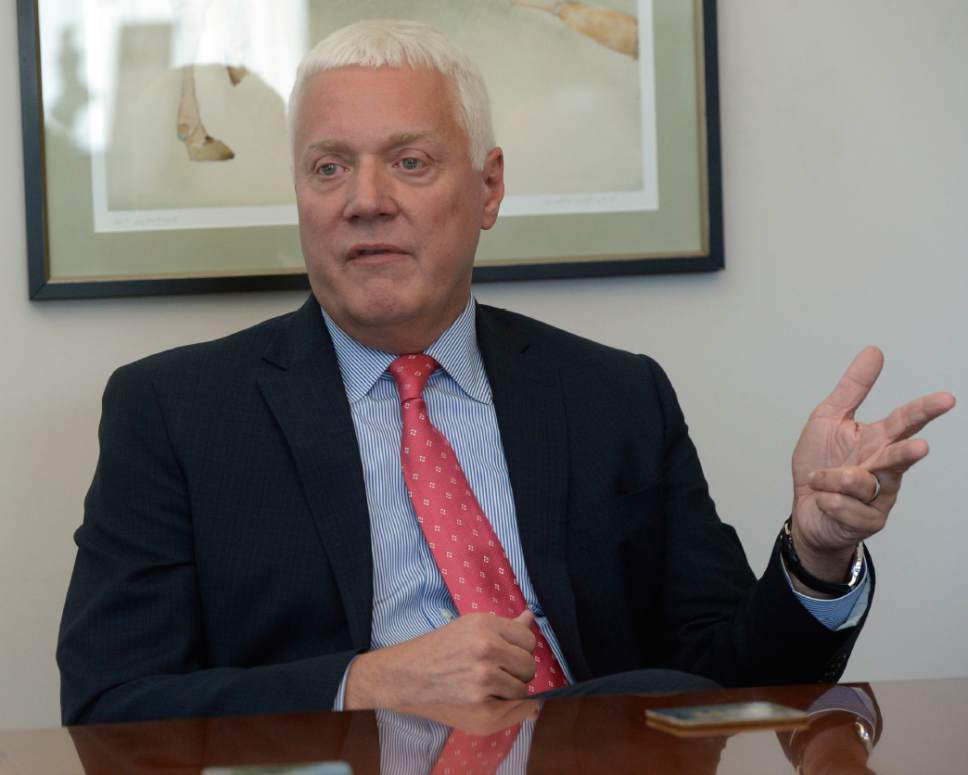This is an archived article that was published on sltrib.com in 2016, and information in the article may be outdated. It is provided only for personal research purposes and may not be reprinted.
It was about 10 years ago and Donna Weinholtz was doing her regular yoga workout when she felt a pop in her back that left her crumpled on the floor feeling "technicolor pain," unable to move.
Doctors told her she had the spine of an 80-year-old woman, with several bulging discs and bone spurs, and recommended surgery to fuse her spine and pain killers. But Weinholtz was wary. Her mother had had the fusion surgery, as did her brother after a motorcycle accident, and she saw opioid painkillers get their claws into both.
So she tried Pilates to strengthen her back, massage, occasional pain treatments from a specialist, and marijuana to take the edge off the pain at the end of the day and help her sleep.
For years the approach was mostly effective. Weinholtz said she would get the marijuana where she could. Then, in April, before heading to California for a vacation, she tried to mail a small amount of the drug to the home where they were staying and got caught.
Two weeks ago, Donna Weinholtz pleaded guilty to two counts — possession of marijuana and possession of drug paraphernalia — and agreed to serve one year of probation and pay a $3,800 fine. Her record will be cleared if there are no subsequent charges in the coming year.
"I think this is a stupid law. I think it's an outdated law. I think it's a law that needs to be reviewed on every level," said Weinholtz. "We have to be mature about this."
For Democratic gubernatorial candidate Mike Weinholtz, he believed in allowing the use of medical cannabis before, but his wife's experience has only strengthened his belief that Utah should become the 25th state to legalize medical marijuana.
"Every day," Mike Weinholtz said, "I don't know if we know the exact number, but it could be tens of thousands of Utahns are dealing with this same decision that Donna had to make: 'Do I break the law or do I deal with my excruciating pain or do I take a drug that is far more dangerous than cannabis in opioids.'"
It is a key policy difference between Weinholtz and incumbent Republican Gov. Gary Herbert and a debate that is unfolding in Utah and nationwide.
A Tribune poll in October found that 58 percent of Utahns support legalizing medical marijuana, compared to 39 percent who were opposed.
And on Tuesday, voters in nine states will go to the polls to vote on marijuana-related measures. Four states — Florida, Montana, North Dakota and Arkansas — will allow or expand the availability of cannabis for medical uses. Five others — California, Nevada, Arizona, Massachusetts and Maine — will vote on whether to legalize recreational marijuana use.
Weinholtz said he believes recreational marijuana is a "bridge too far" for Utah, but he supports a regulated distribution of the substance for medical purposes.
"I think our conservative culture can wrap its head around cannabis as medicine if presented enough of the data and the research," Weinholtz said, "but given our culture's view of alcohol, I think that recreational is, as I've said, a bridge too far for Utah."
Herbert said during a debate between the two candidates that he wants more reliable science about the benefits and risks of medical marijuana, and said the Barack Obama administration should take it off its list of the most regulated Schedule 1 drugs so researchers can investigate its efficacy and safety.
"The disappointment to me is that the current administration in Washington, D.C., has not allowed us to do the research necessary to have science back up some of the anecdotal stories," Herbert said. "There needs to be a process where this can be a controlled substance — prescribed by a doctor and given by a pharmacist where we can control the quality and quantity and not have self-medication."
Herbert said his sister's daughter suffers from seizures and uses cannabis extracts that do not contain THC, a psychoactive component in marijuana.
Other states moving toward legalization via the ballot wouldn't change Herbert's views, said his campaign manager, Marty Carpenter.
Legislation to legalize medical cannabis in Utah stalled each of the last two years, most recently dying in the House without a vote as time ran out on the last night of the session. It likely didn't matter — the watered-down compromise version of the bill likely was a few votes short of passage.
Discussions have been underway for months about how to craft legislation that might pass, but the prospects for such a bill are complicated.
The sponsor of the more aggressive of two bills last year, Sen. Mark Madsen, has retired from the Legislature and it seems unlikely that either his replacement or other new senators will be more favorable toward marijuana legislation.
In addition, The Church of Jesus Christ of Latter-day Saints, whose members make up at least 80 percent of the Utah Legislature, recently made statements opposing legalization efforts in other states even though the church does not object to the use of medical cannabis by its members in those places it is already legal.
Libertarian presidential candidate and long-time cannabis supporter Gary Johnson said in an interview that he thinks California and Nevada will approve the ballot measures allowing recreational use and the other states will adopt legal cannabis laws, creating momentum that other states will have to follow.
"Marijuana is safer than alcohol. It's just safer than everything else that's out there, and medicinally, legal prescription drugs kill 30,000 people a year. There's not been one documented death from marijuana [overdose]," Johnson said. "Let's stop. Let's stop. This is stupid."
If the Legislature can't come to agreement on a bill, cannabis supporters say they will gather the more than 100,000 signatures they would need to put the question before Utah voters in the 2018 election. The Weinholtzes say that, whether Mike is elected governor or not — and polls appear to indicate that he will not be — they will support such a measure.
"You can kind of see the writing on the wall for 2017, and I think it's going to take a ballot initiative," Mike Weinholtz said.
For Donna Weinholtz, the only proof she needs is that it worked, and she said it has worked for numerous other Utahns who shared their own personal stories during a series of legislative hearings on the topic over the past two years.
"You see kids that suffer. You see lines of people that suffer. And I'm sitting in the audience and I have arthritis and I'm in pain. These people can't even function. They can't even function and yet they're denied. Why? I want to know why and I want to overcome it."
Twitter: @RobertGehrke





